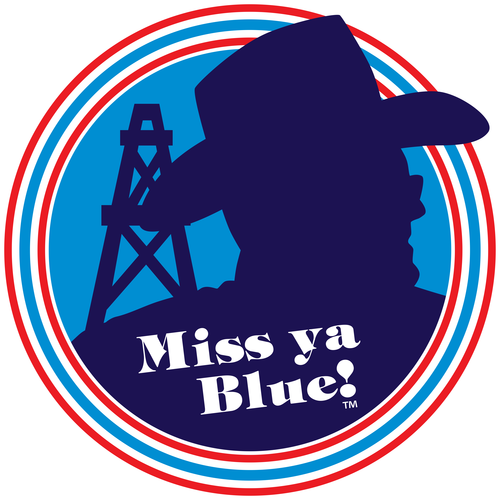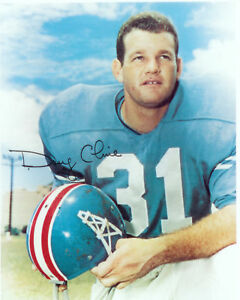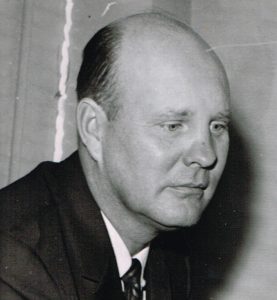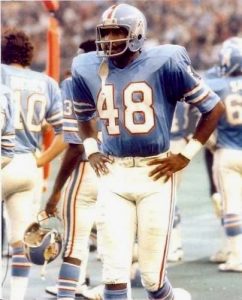Don Floyd: The No-Stats Nightmare
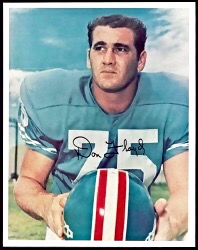
A relatively unsung hero of the Oiler campaigns in the early 1960’s, Don Floyd was a wiry defensive lineman born in Abilene, Texas.
Born July 10, 1938, Floyd played his college football at TCU, where he earned All-American honors twice, All-SWC honors three times, and All-SWC freshman honors while playing for the Horned Frogs.
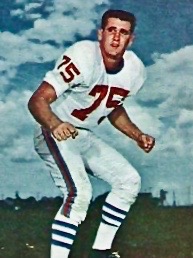
In an era where sack was not even a football term, when teams rarely tracked tackles, and when pro football was just establishing its footing as a legitimate sport (especially the AFL), Floyd nevertheless regularly established his presence in opposing backfields.
In the 1960 NFL draft, Floyd was nabbed by the then-world champion Baltimore Colts in the second round, but the AFL’s Titans of New York also selected him in the league’s inaugural draft before Houston traded for the rights to him.
Floyd forsook the horseshoe helmet for a derrick on his dome, and he immediately became a force for the Oilers in their inaugural campaign of 1960.
“When he stepped on the football field, he could do it all,” said Floyd’s oldest brother Gilbert Floyd.
“Everybody that met him off the field loved him. Guys that faced him on the field worried about him.”
Although playing a statistically untracked position, Floyd was numbered among the league’s elite, using a combination of strength and speed to disrupt the opposition‘s game plans.
Offensive coordinators’ weekly chalk talks regularly included a big red circle around Number 75 on the defense, and they were forced to siphon attention away from other areas of Houston defense.
Floyd used his lanky frame to bend and weave around the opposing team’s offensive tackle or tight end.
That frame allowed him to cover nearly three defensive techniques from the 7, 8, and 9 holes.
WIth his long arms, he would attack the outside shoulder of the offensive tackle, forcing the offensive tackle’s hips to open.
Floyd not only had a quick, twitchy burst, he also had deceptive strength, which came from adding another 30 pounds to his 217-pound frame after the 1960 season.
The leverage he created with this added weight caused the opposing offensive lineman to lose his balance, making way for Floyd to wreak havoc in the backfield.
To offset Floyd, offenses either added an additional tight end as a blocker, or the quarterback rolled away from Floyd in a waggle play set.
Floyd’s impact was felt across the field by offensive tackles, tight ends, and running backs, who had to keep their heads on a swivel around the edge, where Floyd would greet them with forearm shivers under their chinstraps.
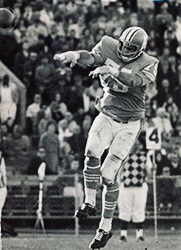
In another then-uncharted area of impact, early Oilers media guides stated that Floyd “has probably blocked more extra point and field goal attempts than any player in the AFL,” even managing to get his fingertips on the overtime field goal by Dallas’ Tommy Booker that gave the Texans the 1962 AFL title over the Oilers.
Floyd was a major reason why the Oilers made it to the 1962 title tilt, intercepting four passes for 58 yards and a touchdown in what was probably his best season.
Despite missing the final five games of the 1963 season with a broken jaw, the media guides also credited Floyd as the Oiler who spent the least time seeking injury treatment, per the Houston trainer.
The only other time Floyd sustained a debilitating injury came in the 1966 season, when he sustained a shattered thumb in the third game that kept him benched for the next nine games.
In seven seasons with Houston, Floyd generated a very productive career, as he racked up multiple all-league honors as a two-time AFL champion, two-time AFL All-Star, two-time All-AFL selection, and a member of the Oilers’ all-time team.
Floyd’s stardom resulted in his high school in Midlothian, Texas, renaming its football stadium in his honor.
Tragically, Floyd did not live to experience this honor as he passed away in 1980 from a heart attack at age 41.
In 2008, Midlothian also named its new multipurpose stadium field in honor of Floyd.
Dillon Holloway is a native Mississippian currently residing in central Oklahoma. He is a rabid football fan and a historian of the sport. He is a husband, a military officer, volunteer teacher and football coach, and emerging guest speaker. He graduated from the University of Mississippi with a bachelor’s in English and a minor in aerospace studies. He played football from pee-wee through high school, winning the 2A Midsouth Association of Independent Schools (MAIS) state championship and was named first-team all-district guard in 2011. Since his first football practice, he has always made the sport a part of his life in some fashion, and writing for Miss Ya Blue! allows him to continue to do so.
#houston #oilers #htown #houstontx #houstonoilers #nfl #astrodome #sports #star #history #football #luvyablue #missyablue #texas #houstonblogger
